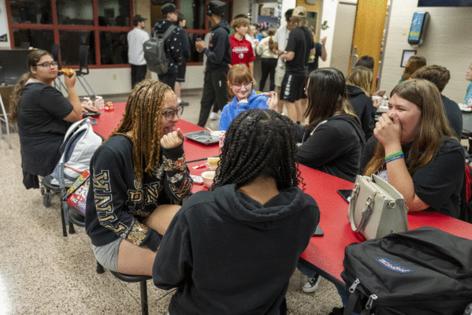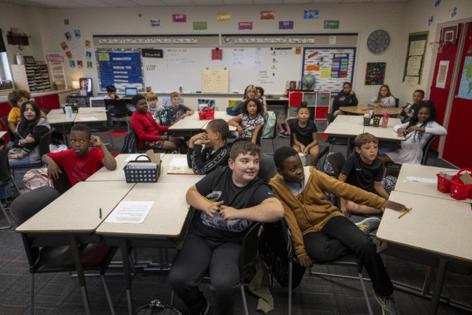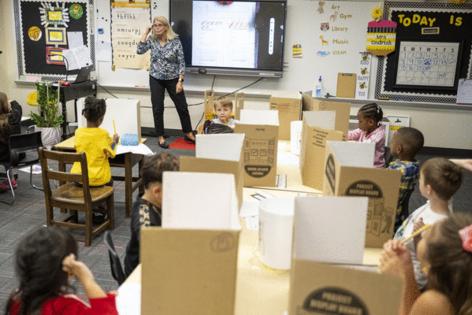Charleroi, Pa., educators, students show unity as community gets thrown into political debate over immigration
Published in News & Features
The quiet halls of Charleroi High School briefly burst to life with the ring of a bell last week, signaling the end of seventh period.
Hundreds of students clad in jeans, athletic shorts and pajama pants made their way to their next class, embracing and jostling each other on their way, before the halls again fell silent.
The day was like any other, despite their school — in a sprawling campus of buildings that hold more than 1,500 students in grades K-12 — recently becoming the latest point of contention in the ongoing political debate surrounding immigration in America.
Over the past few years, the small borough hugging the Monongahela River in Washington County, Pennsylvania, has seen an increase in immigration from people seeking jobs and housing and at times fleeing danger in their home countries.
But earlier this month former President Donald Trump cast Charleroi as a cautionary tale in his continuing rhetoric about Haitian immigrants, a group he previously accused — falsely — of stealing and eating pets in Springfield, Ohio.
School administrators said that while the district has seen increasing immigrant student enrollment, they disagree with Trump's comments, which, in the case of Springfield, led to dozens of bomb threats and evacuations.
"We're worried Charleroi will become the new Springfield, and there's threats to the school," Superintendent Ed Zelich said. "We don't want to get involved in the political aspects of this. We serve students."
About 15% of the 1,567 students in grades K-12 in the district are immigrants, according to numbers provided by Zelich. He said the district has about 225 students who are considered English Language Learners from countries that include Haiti, Venezuela, Brazil and Chile. Five years ago, the district had about a dozen ELL students.
To address the growth, the district spent about $400,000 for the 2023-24 school year to hire more ELL teachers, an ELL coach and an interpreter. Prior to 2023, the district had one ELL teacher, and with enrollment expected to continue growing, the district may need to hire an additional teacher next year, Zelich said.
The general operating budget for the district is about $30.7 million.
The growing population of new students has brought challenges, but Zelich said the entire school community has lent support.
After the parent of Haitian first grade student died of cancer in December, Charleroi assistant principal Amy Nelson opened up her home to the 6-year-old and is now fostering the girl.
Nelson said the child still remembers crossing the Darien Gap — the only land bridge between North and South America and considered extremely remote and dangerous — with her mother, who was battling cancer at the time.
"She talks of stories about when they were traveling through the rainforest," Nelson said. "She is very vocal about the bugs, the dirty water, people carrying her, not having enough food to eat. I know she's already been through that, then went through the devastation of losing her mom."
Now, with the political debate surrounding immigration, Nelson said she sometimes worries about the future of the child, who goes by the name Sarah.
"I've had people make comments to me like, 'Shouldn't she go back if her mom's not here?'" Nelson said. "I'm like, her mom gave up her life to get here. She knew she had tumors but she didn't stop because that's what she wanted for her daughter."
Growing pains
Most Charleroi students seem relatively removed from the latest discourse surrounding them and their classmates, focusing instead on the school lunch menu that day or whether the soccer team could make it back to the state championship after losing by one goal last year.
Marc Lelys, a 17-year-old senior forward on the soccer team, came to the school in November shortly after immigrating from Haiti. He said at first he struggled learning English but now he's concentrating on plans to study and play soccer at Washington & Jefferson College.
When Marc arrived in Charleroi, he joined his mother, who moved to the borough about four years ago after hearing of opportunities for work.
"It was magic," he said of the moment he was reunited with his mother.
Other students who grew up in Charleroi were disheartened to hear Trump painting their hometown as a place that doesn't welcome newcomers.
"We should all be working toward more funding for our school to help accommodate these students instead of trying to make our town a political battlefield," said Cade Carson, a 17-year-old junior who is the student council vice president and school board representative.
Cade said he understands the arguments on both sides of the immigration debate, but hopes the borough can come to a collaborative solution.
"Of course, everyone is entitled to their opinions ... I sort of understand why the people in town could be upset with so many additional students because it costs money to get translators to have them help a lot of people," he said.
"But, I would argue, instead of going on national news, with people on both sides complaining, if we would just sort of ... try to come to a resolution where we can actually help these people and make sure everyone has a fair chance, that would be very beneficial."
Several teachers in the district dispelled claims that all of the new immigrants are of Haitian descent.
"A few years ago, we might have had one student that didn't speak English, and now we have approximately nine in each kindergarten classroom," said teacher Elaine Ondrish. "We have over seven different languages in our building. It's not just Haitians. It's everything. It's just the world we live in now, and it's being misconstrued that it's this one population and it's not."
Ondrish, a kindergarten teacher, also said criticism that some students received less attention from teachers due to the increasing student body was unfounded.
"It makes me mad that so many outsiders think that this is just such a burden," she said. "It's a lot of work. It is a lot of challenges, but for people to say that their local kids aren't getting the attention, that's not true. ... I think they need to take a page out of their kids' book and see how accepting they are, so that way they become more accepting."
While the Pittsburgh Post-Gazette was at the high school last week, at least two new families registered their children for class through interpreter Pierre Richard Mompleisior, who immigrated to Charleroi from Port-au-Prince about four years ago.
Mompleisior, 30, was a teacher in Haiti and speaks Spanish and French Creole. He said one of the biggest concerns immigrant parents have is whether their children will be able to pick up a new language.
"I tell them, don't worry about that," Mompleisior said. "A 5-year-old child or a 7-year-old child has the capacity to even learn three languages at the same time ... even the teens, in six months, they will be able to speak English properly."
As students' English language skills improve, their confidence also follows suit, said English-as-a-second-language teachers Donna Bilon and Christina Sichi, who have been moved at times by seeing their new students' appreciation of both their new school and home.
Sichi said she was heartbroken last year to learn that one of her students, a fifth-grade boy from Haiti, was moving away. She said she asked the boy if he knew what he wanted to do once he was older.
"He said, 'I want to be in the military,' and saluted," Sichi said. "And I asked him if he wanted to go back to Haiti and be in the military and he told me, 'No, I want to be in the United States military and protect all of you that helped me.' He was so sweet."
_____
(c)2024 the Pittsburgh Post-Gazette. Visit the Pittsburgh Post-Gazette at www.post-gazette.com. Distributed by Tribune Content Agency, LLC.












Comments